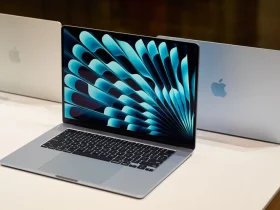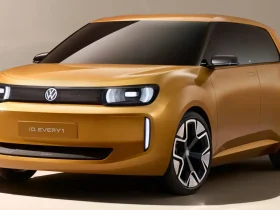The new Subaru Forester is a bit sluggish and it doesn’t have great fuel economy; The new Forester Hybrid solves both of those problems for not a whole lot more money. It’s a no-brainer.
Not just for the customer, but for Subaru, too. The Forester is one of its perennial best-sellers, and compact-crossover buyers are clearly trending toward hybrids, to the point where you wonder why Subaru didn’t make one sooner. In any event, the Forester Hybrid is here now. Subaru is going to sell so many of these.
| Quick Specs | 2025 Subaru Forester Hybrid |
| Engine | 2.5-Liter Four-Cylinder Hybrid |
| Drive Type | All-Wheel Drive |
| Output | 194 Horsepower |
| Fuel Economy | 35 City/ 34 Highway / 35 Combined |
| Base Price / As Tested | $36,415 / $39,415 |
Refined Powertrain & Ride

Photo by: Subaru
This is Subaru’s first serious attempt at a hybrid. Previously, it made a mild-hybrid version of the Crosstrek, and later, a plug-in hybrid version that sold in tiny numbers. The new Forester Hybrid uses a Toyota-style, two-motor system—complete with some Toyota-sourced components—but adapted to work with Subaru’s signature symmetrical all-wheel drive and boxer engine.
A 2.5-liter flat-four reworked for hybrid duty pairs with a small electric motor that acts as a starter and a generator to charge the lithium-ion battery under the trunk. A second, larger motor-generator powers the wheels, though the engine can power the car in certain scenarios. But unlike Toyota’s all-wheel-drive hybrids, the Forester has a traditional center differential and a driveshaft bringing power to the rear wheels. This allows Subaru to get a lot of power to the rear wheels with a relatively small, 1.1-kilowatt-hour battery, and use essentially the same all-wheel drive system as the regular Forester.
It works.

Photo by: Subaru

Photo by: Subaru
The Forester Hybrid’s 194 horsepower is only 14 more than the base model, and the 300-pound weight gain offsets any advantage in power-to-weight ratio. But the instant torque of the electric motor makes the car feel so much more spry. Not quick, mind, but usefully quicker.
More impressive is the refinement here. The flat-four only makes itself known at full throttle, and the handoff between electric and combustion power is truly seamless. If not for a green “EV” light on the digital gauge cluster, you’d never know when the Forester was driving solely on electric power.
Subjectively, the Forester Hybrid is much nicer to drive than the standard variant. It’s quicker and more refined, and there’s a real fuel-economy benefit, too. The EPA figure jumps from 29 miles per gallon overall to 35 mpg for the Hybrid model, and across a couple hundred miles of mixed terrain south of San Francisco, we easily matched this.
Subaru concedes that the Forester Hybrid doesn’t have quite as good economy as the 39-MPG Toyota RAV4 and 37-MPG Honda CR-V all-wheel drive hybrids—which just use a small electric motor on the rear wheels—but it was willing to make that trade for all-wheel drive capability.

Photo by: Subaru
Pros: More Performance, More Fuel Economy, More Refinement
At an off-road course in the Hollister Hills, the Forester Hybrid proved its worthiness on trails. Our tester was a Sport model with Subaru’s X-Mode system, which optimizes for various off-road terrain. The trails weren’t particularly challenging, but maybe not something you’d attempt in any regular mid-size crossover. At least, not one wearing road-oriented all-season tires like this. And you can’t feel the car shuffle between electric and gas power, so there’s no need to adjust technique.
Back out on the road, the Forester isn’t exactly fun, but it’s very competent. The ride quality remains great despite the extra weight of the hybrid system, and the brake pedal doesn’t have any of the weird springy feeling you often get in hybrids. If you were coming out of a regular Forester, you’d hardly notice a difference, and that’s a good thing.
The best hybrid systems ask nothing of the driver and simply deliver better performance and fuel economy in return. This is one of those systems.
Easy to Live With

Photo by: Subaru
Beyond that, it’s much the same story for the Forester hybrid as the standard car. The interior feels fine, with most variants getting “animal-free” cloth or vinyl trim—save for top-tier Touring, which gets leather—but the 11.6-inch vertical-screen infotainment system feels years, if not an entire decade, behind the times. But you’ll just use Apple CarPlay or Android Auto, both wireless, anyhow, so it might not be a huge deal.
I wish there were more physical controls than just HVAC temperature, defroster, and volume, and the digital gauge screen doesn’t offer all that much more functionality than the standard Forester’s analog cluster.

Photo by: Subaru

Photo by: Subaru

Photo by: Subaru
Cons: Dated Infotainment System, Less Efficient Than Rivals, Still Slow
But it’s easy to live with. The Forester Hybrid offers great visibility, and this Subaru feels smaller than other compact crossovers in the segment. Subaru is also quite proud of the fact that the hybrid system doesn’t impact interior space, though you do have to give up the spare tire.
The standard safety tech, including adaptive cruise control and steering assist on the highway, works very well, and this mid-tier Sport tester was very well equipped.
Good Value

Photo by: Subaru
Subaru packages the hybrid system with features that come as an optional package on regular Forester models. So, while going hybrid costs about $2,500 to $3,000, depending on trim, the difference is effectively less if you include that option package. Also of note, Subaru doesn’t offer the hybrid on the $31,415 base model, so the barrier to entry is $35,390.
Our Sport tester stickered for just $39,415, which feels right on the money. Under $40,000 for an efficient, refined, off-road capable family crossover that has all the features you need. And though the hybrid costs more, the fuel-economy benefit and the refinement of the system make it worthwhile in my eyes, beyond the extra standard equipment.
Like I said, it’s a no-brainer.

65
Source: Subaru

65
2025 Subaru Forester Hybrid
Engine
2.5-Liter Four-Cylinder Hybrid
Output
194 Horsepower
Drive Type
All-Wheel Drive
Weight
3,913 Pounds
Efficiency
35 City / 34 Highway / 35 Combined
Seating Capacity
5
Towing
1,500 Pounds
Motor
Three-Phase AC Synchronous
Cargo Volume
27.5 / 69.1 Cubic Feet
Base Price
$36,415
As-Tested Price
$39,415
On Sale
Now











Leave a Reply